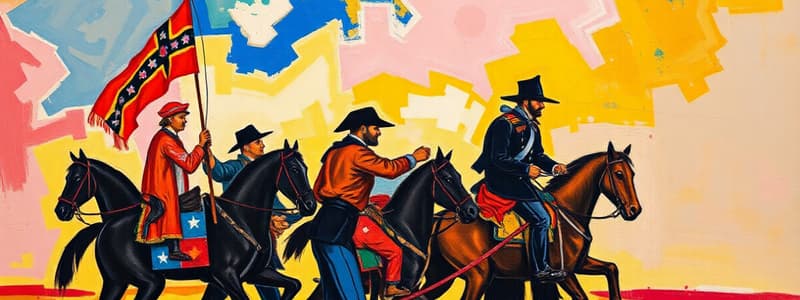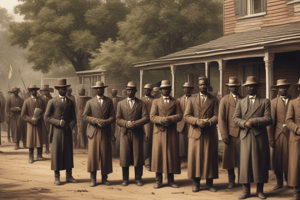Podcast
Questions and Answers
What was the immediate consequence of the shot fired during the conflict?
What was the immediate consequence of the shot fired during the conflict?
- Increased tensions between the North and South
- A significant loss of Native American lives (correct)
- The creation of the Medals of Honor
- A peaceful resolution between settlers and tribes
Which invention by Eli Whitney significantly impacted the economy of slavery in the South?
Which invention by Eli Whitney significantly impacted the economy of slavery in the South?
- The steam engine
- The spinning wheel
- The cotton gin (correct)
- The power loom
How did the relationship between Anglo settlers and Native American tribes evolve after the events at Wounded Knee?
How did the relationship between Anglo settlers and Native American tribes evolve after the events at Wounded Knee?
- It led to increased integration
- It improved rapidly and peacefully
- It remained contentious for decades (correct)
- It resulted in land agreements
What role did the cotton gin play in the institution of slavery?
What role did the cotton gin play in the institution of slavery?
What was one of the consequences of industrialization in the United States during the late 19th century?
What was one of the consequences of industrialization in the United States during the late 19th century?
Which editorial stance did L. Frank Baum take regarding the Army's actions at Wounded Knee?
Which editorial stance did L. Frank Baum take regarding the Army's actions at Wounded Knee?
What was the impact of Whitney's cotton gin on the economic feasibility of slavery?
What was the impact of Whitney's cotton gin on the economic feasibility of slavery?
What did the Army award for the actions at Wounded Knee?
What did the Army award for the actions at Wounded Knee?
What was President Lincoln's main desire as the Civil War ended?
What was President Lincoln's main desire as the Civil War ended?
What tone replaced reconciliation during the decade following the Civil War?
What tone replaced reconciliation during the decade following the Civil War?
What action did Southern state governments take in the aftermath of the Civil War?
What action did Southern state governments take in the aftermath of the Civil War?
What did the Reconstruction Act of 1867 implement in Southern states?
What did the Reconstruction Act of 1867 implement in Southern states?
What was one of the consequences of the Reconstruction Act of 1867?
What was one of the consequences of the Reconstruction Act of 1867?
How did the Southern legislatures react to their defeat in the Civil War?
How did the Southern legislatures react to their defeat in the Civil War?
What was one of the Reconstruction Amendments aimed at?
What was one of the Reconstruction Amendments aimed at?
What analogy was used to describe Lincoln's intervention in the Southern states?
What analogy was used to describe Lincoln's intervention in the Southern states?
What was the main purpose of the Jim Crow Laws?
What was the main purpose of the Jim Crow Laws?
Which method was NOT used to limit African-American voting rights?
Which method was NOT used to limit African-American voting rights?
What loophole allowed poor and uneducated whites to vote despite the restrictions?
What loophole allowed poor and uneducated whites to vote despite the restrictions?
What was the impact of the Jim Crow Laws on African-American voter registration in Louisiana from 1868 to 1901?
What was the impact of the Jim Crow Laws on African-American voter registration in Louisiana from 1868 to 1901?
Which movement did W.E.B. Du Bois help found that later became the NAACP?
Which movement did W.E.B. Du Bois help found that later became the NAACP?
Marcus Garvey's vision for African Americans involved what significant action?
Marcus Garvey's vision for African Americans involved what significant action?
What did the 14th and 15th Amendments seek to protect for African-Americans?
What did the 14th and 15th Amendments seek to protect for African-Americans?
Which of the following statements is true regarding the literacy tests used for voting?
Which of the following statements is true regarding the literacy tests used for voting?
What major change did the rise of factories bring to the labor force in the United States?
What major change did the rise of factories bring to the labor force in the United States?
What was one consequence of the dangerous working conditions in factories?
What was one consequence of the dangerous working conditions in factories?
How did the events like the Titanic sinking and the Triangle-Shirtwaist Fire impact societal views?
How did the events like the Titanic sinking and the Triangle-Shirtwaist Fire impact societal views?
What aspect of capitalism did Karl Marx criticize?
What aspect of capitalism did Karl Marx criticize?
What social issue was prevalent in factories during the industrialization period?
What social issue was prevalent in factories during the industrialization period?
Which of the following factors contributed to the increase in class hatred during industrialization?
Which of the following factors contributed to the increase in class hatred during industrialization?
What was a significant reason for the establishment of safety regulations in factories?
What was a significant reason for the establishment of safety regulations in factories?
What was a common escape for workers facing harsh conditions in factories?
What was a common escape for workers facing harsh conditions in factories?
What impact did the Platt Amendment have on Cuba?
What impact did the Platt Amendment have on Cuba?
Which president's popularity surged as a result of the Spanish-American War?
Which president's popularity surged as a result of the Spanish-American War?
What was Theodore Roosevelt's political approach known as?
What was Theodore Roosevelt's political approach known as?
What did Roosevelt refer to as his promise of fairness?
What did Roosevelt refer to as his promise of fairness?
What concerns did business leaders like JP Morgan have regarding Roosevelt?
What concerns did business leaders like JP Morgan have regarding Roosevelt?
What aspect of politics did Roosevelt primarily target?
What aspect of politics did Roosevelt primarily target?
How was Theodore Roosevelt's energy perceived by his contemporaries?
How was Theodore Roosevelt's energy perceived by his contemporaries?
What characteristic of Roosevelt's personality was highlighted in the passage?
What characteristic of Roosevelt's personality was highlighted in the passage?
What was the primary reason for Roosevelt’s reputation as a peace-maker during his presidency?
What was the primary reason for Roosevelt’s reputation as a peace-maker during his presidency?
What approach did William Howard Taft use for foreign intervention in Latin America?
What approach did William Howard Taft use for foreign intervention in Latin America?
What distinguished Woodrow Wilson's approach to foreign policy from that of Taft?
What distinguished Woodrow Wilson's approach to foreign policy from that of Taft?
Why did Theodore Roosevelt decline to run for a second full term in 1908?
Why did Theodore Roosevelt decline to run for a second full term in 1908?
Which presidential election was noted for the close competition between third parties?
Which presidential election was noted for the close competition between third parties?
During which conflict did Russia suffer humiliating defeats against Japan?
During which conflict did Russia suffer humiliating defeats against Japan?
How did Roosevelt's presidency affect U.S. interventionist policies in Latin America?
How did Roosevelt's presidency affect U.S. interventionist policies in Latin America?
What was one major outcome of the Republican split during the 1912 election?
What was one major outcome of the Republican split during the 1912 election?
Flashcards
Reconstruction
Reconstruction
The period after the American Civil War (1865-1877) focused on reintegrating the Southern states into the Union and defining the rights of formerly enslaved people.
Lincoln's Reconstruction Plan
Lincoln's Reconstruction Plan
Lincoln's vision for a peaceful and forgiving reunification of the nation after the Civil War.
Black Codes
Black Codes
Laws passed by Southern states after the Civil War aimed at limiting the rights of African Americans, despite their newly acquired freedom.
Martial Law
Martial Law
Signup and view all the flashcards
Reconstruction Amendments
Reconstruction Amendments
Signup and view all the flashcards
Disenfranchisement
Disenfranchisement
Signup and view all the flashcards
Terrorism
Terrorism
Signup and view all the flashcards
Jim Crow
Jim Crow
Signup and view all the flashcards
Jim Crow Laws
Jim Crow Laws
Signup and view all the flashcards
Poll Tax
Poll Tax
Signup and view all the flashcards
Literacy Test
Literacy Test
Signup and view all the flashcards
Grandfather Clause
Grandfather Clause
Signup and view all the flashcards
NAACP
NAACP
Signup and view all the flashcards
W.E.B. Du Bois
W.E.B. Du Bois
Signup and view all the flashcards
Marcus Garvey
Marcus Garvey
Signup and view all the flashcards
Wounded Knee Massacre
Wounded Knee Massacre
Signup and view all the flashcards
Cotton Gin's Impact on Slavery
Cotton Gin's Impact on Slavery
Signup and view all the flashcards
Industrial Revolution and its Impact
Industrial Revolution and its Impact
Signup and view all the flashcards
Industrial Revolution's Role in Civil War
Industrial Revolution's Role in Civil War
Signup and view all the flashcards
Anglo-Native American Relations
Anglo-Native American Relations
Signup and view all the flashcards
Post-Civil War Race Relations
Post-Civil War Race Relations
Signup and view all the flashcards
Medals of Honor for Wounded Knee
Medals of Honor for Wounded Knee
Signup and view all the flashcards
Capitalism
Capitalism
Signup and view all the flashcards
Socialism
Socialism
Signup and view all the flashcards
Social Inequality
Social Inequality
Signup and view all the flashcards
Industrialization
Industrialization
Signup and view all the flashcards
Child Labor
Child Labor
Signup and view all the flashcards
Low Wages
Low Wages
Signup and view all the flashcards
Unsafe Work Conditions
Unsafe Work Conditions
Signup and view all the flashcards
Industrial Disasters
Industrial Disasters
Signup and view all the flashcards
Dollar Diplomacy
Dollar Diplomacy
Signup and view all the flashcards
Missionary Diplomacy
Missionary Diplomacy
Signup and view all the flashcards
Third Party
Third Party
Signup and view all the flashcards
Russo-Japanese War
Russo-Japanese War
Signup and view all the flashcards
Mediation
Mediation
Signup and view all the flashcards
Two Term Tradition
Two Term Tradition
Signup and view all the flashcards
Democracy
Democracy
Signup and view all the flashcards
Platt Amendment
Platt Amendment
Signup and view all the flashcards
Theodore Roosevelt's Presidency
Theodore Roosevelt's Presidency
Signup and view all the flashcards
Square Deal
Square Deal
Signup and view all the flashcards
Business Leaders' Fears
Business Leaders' Fears
Signup and view all the flashcards
Progressivism
Progressivism
Signup and view all the flashcards
Spanish-American War's Impact
Spanish-American War's Impact
Signup and view all the flashcards
Roosevelt's Fight Against Corruption
Roosevelt's Fight Against Corruption
Signup and view all the flashcards
Roosevelt and Monopolies
Roosevelt and Monopolies
Signup and view all the flashcards
Study Notes
No specific text provided. Therefore, no study notes can be generated. Please provide the text or questions.
Studying That Suits You
Use AI to generate personalized quizzes and flashcards to suit your learning preferences.




